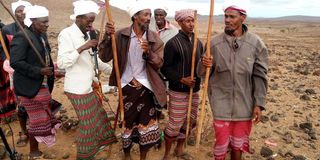Kenya, Ethiopia won't fight because of community disputes: officials

Members of the Gabbra community during their new year celebration in Horonderi village in October 2020.
Kenya and Ethiopia have vowed not to be drawn into waging war against by the longstanding disputes related to ethnic antagonism between the Gabbra and Borana communities.
Speaking in Saru in North Horr Sub-County along the Ethiopia-Kenya border during a peace meeting on Saturday, administrators and security agencies from both countries said they will not allow the constant feuds between the groups to lead to a bilateral standoff.
Dilo District Warada (Commissioner) Guyo Huqa and his Tar Tar counterpart Jattani Godana, flanked by peace ambassadors from Ethiopia, took part in the talks brokered by the Community Initiative Facilitation and Assistance (CIFA-Kenya) – an initiative funded by the African Union (AU) and the German government (GIZ).
“We all have a role to play. It’s crucial, then, that we too need to rise and act effectively to broker lasting peace between the feuding communities, ” Mr Huqa said.
Affirmed commitment
He affirmed the commitment of both countries to resolve long-standing disputes between the Gabbra and Borana communities along the Ethiopia-Kenya border by negotiating with the regions involved on the basis of respecting historical facts and international law.
He called on each side to uphold the responsibility to protect populations at risk. While citing previous atrocities in Cambodia, Srebrenica, Rwanda and Kosovo, he said failure of individual states and the international community could lead to tragedy.
Tar Tar District Warada Jattani Godana said that the borderlines such as Forole, Dukana, Dilo, Tar Tar regions were “undisputable parts” where both nations could build infrastructure, deploy defensive capabilities, and conduct patrols.
Expressed shock
He expressed shock that the Gabbra and Borana communities, which speak a similar dialect and had common ancestries, were turned against each other by people with selfish interests.
He said that criminals should be treated independently instead of blanket condemnations that have been the norm whenever atrocities happen.
He maintained that not all Gabbras or Boranas were enemies of peace, but a few individuals were gaining from the wars between them.
Both administrators pledged to work with the Kenyan authorities to stem crime along the border.
They noted that the root cause of killings along the Ethiopia-Kenya border was cattle rustling which is orchestrated by a few individuals from the two communities.
Lasting peace
Ethiopian officials said they will no longer allow stolen cattle from Kenya to be sneaked into their country, and also asked Kenyan authorities to do the same for the sake of brokering lasting peace.
Their host, Dukana Sub-County DCC Solomon Mwapapale, praised the goodwill of the Ethiopian authorities in helping to fight the endemic ethnic atrocities between the two communities.
"We're delighted by the bilateral relations we enjoy with Ethiopia and will not allow petty livestock thefts and felonies," Mr Mwapapale said.
He said that the atrocities have many times threatened to strain the bilateral relations between Ethiopia and Kenya.
Recent incident
He cited a recent incident when Ethiopian authorities bashed Kenya for harbouring fighters from the Oromo Liberation Front (OLF) who are said to have crossed into Kenya after committing crimes back home.
He explained that the two countries were considering opening all the border points but after only ensuring that no illegal goods would get smuggled in and out of the two countries.
The Border Patrol Unit (BPU) Inspector Peter Logole told the communities living on the border to cease pushing security officers from both countries into a fight.
Community Initiative Facilitation and Assistance, CIFA-Kenya CEO Hassan Adan, expressed his delight that the delegations from both countries opened up and freely talked about the root causes of the animosities.
Youth manipulation
Some of the delegates expressed concern about the manipulation of youths and women by some local leaders and politicians to perpetrate ethnic atrocities between the two communities.
Kame Diba, a resident of Dukana, confessed that women played an active role in fanning ethnic conflicts by encouraging their husbands and sons to raid rival communities.
She said that some women would even go the extra mile to call their husbands or sons cowards if they turned down their pleas to go to war.
She said that some conflicts were sponsored by leaders who were pursuing political goals.
Ties between Kenya and Ethiopia have many a times been strained over a row about cattle rustling and insurgent groups.
The latest outburst of hostilities between Ethiopian and Kenyan forces was witnessed in December 2020 when nine Kenyans from Butiye area were arrested and detained by the Ethiopian Federal Police for allegedly harbouring OLF fighters.
The deadliest case was witnessed in May 2019 when more than 11 Kenyans were killed by Ethiopian insurgents in Forole.




